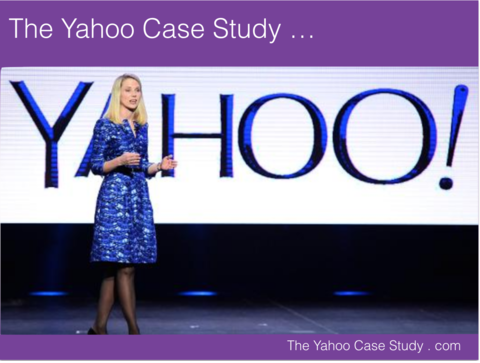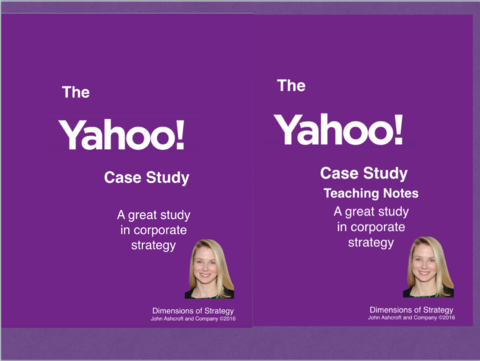|
The Yahoo Case Study ... an update ...
Hi Friend,
|
|  |
$ 1 Million Dollars a Week for Yahoo's Mayer …
When Yahoo is absorbed by Verizon Communications in a few weeks time, it will be the end of an era for one of the pioneering names of the internet age.
It will also conclude the remarkable five-year run of Yahoo's chief executive, Marissa Mayer, who was paid nearly a quarter of a billion dollars while presiding over the company's continued decline. Almost $ 1 Million Dollars a week!
Did Mayer do a good job? For shareholders, almost certainly. In July 2012, the month she was hired, Yahoo's share price was $15.65. In June 2017, Yahoo closed at $50.60. As Yahoo shareholders profited, so did Ms. Mayer. By the time the deal closes, Mayer will have made about $239 million, based on the June share price.
Ms. Mayer was hailed as a savior when she left Google for Yahoo in 2012. But during her tenure, Yahoo was hit by two big business challenges. Advertisers were abandoning Yahoo. Users were shifting ever more attention to Google and Facebook. By the end of 2016, the company was so weakened operationally, the board had little choice but to sell. Did Mayer do a good job?
By Wall Street's most basic yardstick - Yahoo's stock price - Marissa Mayer earned every penny she got. Yahoo's share price more than tripled during her tenure. After the $4.5 billion sale to Verizon, shareholders will still own an investment company with $57 billion of stock in two Asian internet companies, Alibaba Group and Yahoo Japan.
Ms. Mayer's pay was mostly in stock and stock options. She reaped the rewards alongside the other stockholders. "The only sign you can point to when evaluating a company over a long period of time is how shareholders have done in the exchange," said David Wise, of Korn Ferry Hay Group. "Over the last five years, Yahoo shareholders couldn't have done a lot better than this."
More than most chief executives, Marissa Mayer was working for those shareholders. Mayer was essentially hired by one hedge-fund manager, Daniel S. Loeb, who got her predecessor fired and won three seats on Yahoo's board in 2012. Mr. Loeb was particularly interested in finding a way to unlock the value of Yahoo's stake in Alibaba, which was already shaping up to be one of China's leading internet companies. He pushed the board to recruit a star like Ms. Mayer to get people excited about a company that had been stumbling for years. Check out “The Yahoo Case Study”
|
| |
 |
The Saturday Economist (and Strategy) Club …
To lure Mayer from Google and compensate her for options forfeited, Yahoo's board offered a lucrative employment agreement. Mayer initially received restricted stock worth $35 million and stock options worth $21 million, along with a cash salary and bonus.
Most of Marissa Mayer's pay check ultimately came from the gains in Yahoo's Alibaba and Yahoo Japan investments. Thanks to an investment made in 2005, Yahoo had a 24 percent stake in Alibaba, which today is China's leading e-commerce company.
When Alibaba first sold shares to the public in 2014, Yahoo sold 140 million shares in the offering. It still holds 384 million shares, which are now worth about $48 billion. Yahoo also owns about 36 percent of Yahoo Japan, now worth about $9 billion. The shares were received as part of a deal struck in 1996, shortly after Yahoo was founded.
Ms. Mayer focused on turning around Yahoo's internet business. It was in danger of missing the mobile revolution and was experiencing steady declines in its display and search advertising. Through a combination of acquisitions and hiring, Mayer vastly expanded Yahoo's mobile team, which initially produced some buzzy hits like the Yahoo Weather app and Yahoo News Digest, along with updates of core Yahoo features like fantasy sports and email. Yet Ms. Mayer largely failed in her quest to make Yahoo a "daily habit" for more users in online video, search and messaging.
Ms. Mayer also made a bold bet on social media, buying the money-losing blogging site Tumblr for $1.1 billion in 2013. Yahoo did little with the acquisition and was eventually forced to write down much of the purchase price.
Yahoo's board recognised Ms. Mayer's failure to meet business targets and docked her bonuses and stock awards in four of the five years she was in charge. But under terms of her original employment agreement, it also granted her new shares annually, easing the pain.
Was Mayer overpaid? Peter Monaco, who was a vice president for engineering at Yahoo for three years before leaving for Facebook last September, said Ms. Mayer does not get enough credit for transforming Yahoo's culture. "She eliminated the dead wood, drove out the politics, put in place compensation policies that rewarded high achievers and energized people to create great products again," he said.
Arguably, Yahoo was unfixable. The company's DNA and technology were built around its original identity as a web portal — a powerful position in the early 2000s but increasingly outmoded in the mobile era, as apps and phone platforms like iOS and Android became the gateways to the internet. Yet mobile was moving fast. Lots of time for Yahoo to make the change. The real problem was not in mobile but in the Empires of the Cloud.
Yahoo had been vulnerable to digital disruption from the emerging Google and Facebook competition. Marissa Mayer failed to effect a recovery in the core business, damaged by deals already done with Google and Facebook. Was Marissa Mayer to blame?
In “The Yahoo Case Study” we argue the fight was over, before Marissa Mayer arrived. It's another great study in corporate strategy along with the Apple, Lego and Twitter case studies. Check out
“The Yahoo Case Study” together with financials, videos and teaching notes ...
|
| | | |
|
|
| Don't miss our regular updates on Corporate Strategy in the Masters of Strategy Series.
© 2016 John Ashcroft and Company, Economics, Strategy and Social Media, experience worth sharing.
______________________________________________________________________________________________________________
The material is based upon information which we consider to be reliable but we do not represent that it is accurate or complete and it should not be relied upon as such. We accept no liability for errors, or omissions of opinion or fact. In particular, no reliance should be placed on the comments on trends in financial markets. The receipt of this email should not be construed as the giving of advice relating to finance or investment..
______________________________________________________________________________________________________________
If you do not wish to receive any further Masters of Strategy updates, please unsubscribe using the buttons below or drop me an email at jkaonline@me.com. If you enjoy the content, why not forward to a friend, the can sign up here ...
_______________________________________________________________________________________
For details of our Privacy Policy and our Terms and Conditions check out our main web site. Dimensions of Strategy dot com
|
| |
|
|